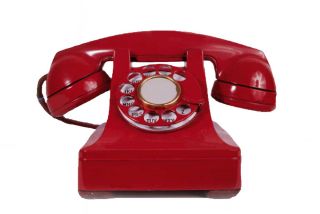Personality
Phone Call From the Dead?
A mysterious phone call from nowhere alerts a bestselling writer to be vigilant.
Posted September 27, 2013

When I interviewed Dean Koontz for a biography about his life and work, he told me a number of interesting stories. The following one is appropriate for a spooky fall season blog:
On September 20, 1988, Dean had an experience that he would not write about for nearly a decade, but he claimed it in his essay for Beautiful Death as his one possible encounter with evidence for life after death.
He was at work that day in his office when the phone rang. He picked it up and heard a female voice that sounded far away. She spoke with a sense of great urgency. “Please, be careful!” she said.
A bit startled, Dean asked, “Who is this?”
He received no response. The woman repeated the warning three more times, and each time she said it, her voice became more distant.
When the line fell silent, Dean sat there listening for a while, uncertain what to make of it. The voice had sounded eerily like his mother’s, but she had been dead for nearly two decades. “A voice is much harder to remember than a face,” he said, “so I thought I was being melodramatic.”
His number was unlisted, so it could not have been a prank call aimed at him. Perhaps it had been a number simply misdialed. He mentioned the incident to his wife, but told no one else.
“It was such a strange call,” says Dean. “I don’t claim that it was a ghost. I don’t know what I believe. It certainly was odd. People report these kinds of events all the time, and it’s always struck me as interesting that everyone seems to have had an experience or two of the uncanny. Sometimes I believe that call was from my mother and sometimes that it was a very strange, serendipitous wrong number. I think you always have to keep some skepticism about things like this, but it’s comforting to think that there may be a realm where the personality survives.”
Two days after this call, Dean went to visit his father at the facility where he lived. The staff was dealing with Ray’s behavioral problems, and they had asked Dean to come and talk with him. Ray had punched another resident, a man on a walker, and the nurses were worried.
Dean was unaware that Ray had used some of his small allowance to go buy a yellow-handled fishing knife and had honed it to razor sharpness and oiled the hinge to make it open like a switchblade.
When Dean came into the room, Ray moved fast. He grabbed the knife from a drawer, and Dean had to try to wrestle it away from him. He just managed to avoid being slashed.
There were many witnesses to this altercation, and one of them called the police. Finally Dean got the knife without incident and carried it out into the hall—just as the police arrived.
They drew their guns and ordered him, "Drop the knife!"
Dean was startled. “It’s not me you want,” he insisted. “It’s him in there.” He pointed into his father’s room.
“Drop the knife!” they repeated, still training their weapons on him.
Dean froze. “All of a sudden,” he recalls, “I realized that they were going to shoot me if I didn’t drop the knife. They thought I was the perpetrator. So I dropped it and obeyed them. That was one of the worst moments of my life. My own stupidity almost got me killed.”
Koontz would later include this scene in his 1993 novel, Mr. Murder, when Marty Stillwater, the protagonist, has a similar encounter (though under different circumstances) with the police.
Eventually the police realized that Ray was the dangerous party. They took him to a psychiatric ward where he could be kept for observation.
But Dean thought again about the mysterious phone call. It had made him more vigilant, and as a result, had possibly saved his life. He never again received another such call (although in another novel he did provide a separate phone line for ghosts).


